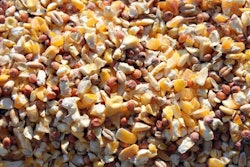A recent study has demonstrated the importance of assessing in-feed enzyme activity, highlighting a variation in performance characteristics of xylanases.
The study, a broiler trial conducted at a Polish University, assessed the thermostability of three different commercial xylanases applied to wheat-based diets, processed at three different conditioning temperatures (80°, 85° and 90°C) prior to pelleting. The results showed that conditioning temperature had a significant impact on enzyme activity, with only one of the xylanase enzymes sustaining a consistent effect across the temperature range.
AB Vista’s Global Technical Director, Dr. Hadden Graham, says that being aware of the potential for variation in enzyme activity – and testing for it – is critical to ensuring feed consistency.
“The success of feed formulations increasingly depends on performance benefits delivered by enzymes, so having the ability to test feed for enzyme activity is an important part of quality assurance procedures.
“This study demonstrates that we can’t simply add xylanase and assume it’s having the expected effect, particularly at the higher pelleting temperatures in common commercial use.”
The two products that lost activity at higher processing temperatures were subsequently unable to sufficiently reduce digesta viscosity in broilers at 35 days, and this was linked to a reduction in animal performance.
The study found that only Econase XT maintained consistent enzyme performance across processing temperatures. In addition, Econase XT maintained a consistent 0-35 day body weight corrected feed conversion ratio at each temperature.
“This trial shows the importance of analyzing in-feed enzyme activity, particularly because temperatures can vary even within a feed mill, between targets and actuals. The results also demonstrate why enzyme selection can play a key role in animal performance,” Dr. Graham says. “Econase XT is easily measured in feeds, ensuring better feed quality control and ultimately peace of mind for feed producers.”












